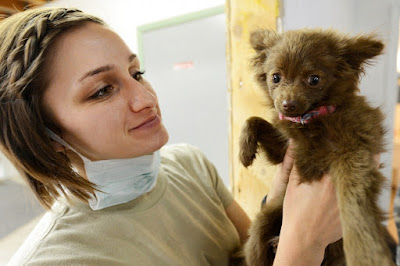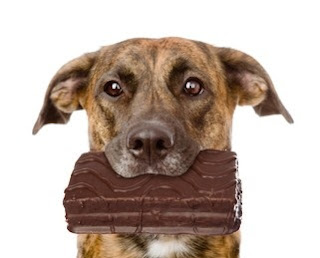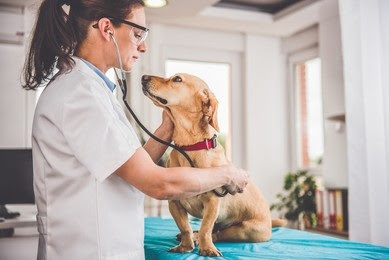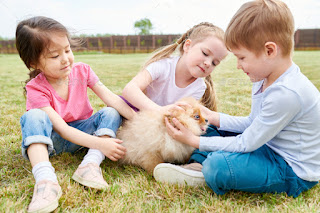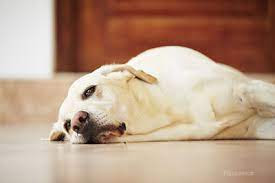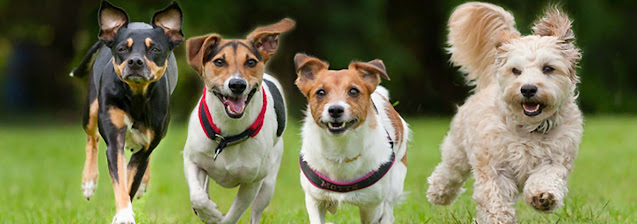Puppy Basics 101 - How To Take Care Of A Puppy - What You Must Know
Puppies are undeniably among of the cutest creatures on the world. Parenting a new dog, on the other hand, is no easy task. Here's a list of resources to assist you in caring for your new family member.
You can very much bet on three things when it comes to bringing your new puppy home for the first time: overwhelming excitement, cleaning up your dog's accidents, and a huge lifestyle shift. A growing puppy requires much more than a feeding dish and a doghouse to flourish, as you'll soon discover. And, while it may seem like a lot of work at first, it's definitely worth it. In those initial few sleep-deprived weeks, establishing excellent and healthy behaviours will create the groundwork for many dog-years of enjoyment for you and your puppy.
1. Why Do You Want a Puppy?
Ask yourself a few questions before getting a dog. What makes you desire a dog in the first place? Will you have the time, room, and funds to properly care for and entertain your puppy? Which breed are you looking for? Know the answers before you start looking, because once you start looking, you'll almost certainly end up with a puppy!
2. Where to Get Your Puppy
When it comes to picking a puppy, you have a lot of alternatives. Because there are so many homeless pets, adopting from a shelter, rescue group, or the pound is a terrific idea. If you want to hire a breeder, the American Society for the Prevention of Cruelty to Animals (ASPCA) recommends finding a small-scale breeder who does not sell to dealers or pet stores. Meet the mother or relatives of your dog at the breeder's house and kennel.
3. Get Ready for Your Puppy
Before you bring your new puppy home, you'll need the following items:
- Food for puppies
- Water and food dishes, as well as a leash and collar with your phone number and your veterinarian's information.
- Bed for your dog
- Brushes for shaving
- To keep your puppy contained, use a folding fence or a crate.
- Toys to chew
4. Shop for Quality Food
Because your puppy's body is still developing in important ways, you'll need to choose a puppy food rather than an adult dog food. To guarantee that the food you pick meets your pup's nutritional needs, look for a statement from the Association of American Feed Control Officials (AAFCO) on the label.
Between the ages of 9 and 12, small and medium-sized breeds can transition to adult dog food. Until they reach the age of two, large breed dogs should eat puppy kibbles. Ensure that your puppy has access to fresh, plenty water at all times.
Feed many times every day:
- Age 6-12 weeks – 4 meals per day
- Age 3-6 months – 3 meals per day
- Age 6-12 months – 2 meals per day
5. Watch the Table Scraps
Feeding your pet from your plate is a poor idea. Begging is a difficult habit to kick! More importantly, some foods, such as grapes, raisins, alcohol, garlic, onions, avocados, salt, and chocolate, can be hazardous to dogs. If you suspect your dog has eaten something poisonous, contact the Animal Poison Control Center at (888) 426-4435 or your veterinarian immediately.
6. Chocolate and Dogs
One of the primary components of chocolate is difficult for dogs to break down. The most deadly sort of chocolate for your dog is baking chocolate. Though a small amount of white or milk chocolate won't hurt, dogs will eat whatever is available. So keep chocolaty items away from your puppy or dog to avoid temptation. To see whether your puppy need medical assistance, contact the Animal Poison Control Center at (888) 426-4435 or your veterinarian straight away.
7. Puppy-Proof Your House
Puppies, like infants, explore with their lips. You'll need to do a few things before bringing your puppy home to keep them safe.
- Breakables and electrical cables should be moved away from the dog's reach.
- Low-level windows should be closed.
- Medications, cleaning supplies, and motor oil and antifreeze should all be kept in a safe place.
- For trash, choose a garbage container with a secure lid.
8. Bringing Your Puppy Home
Give your puppy plenty of love and attention during their first few days in their new home. Play with them on a regular basis. At night, bring their bed or cage into your room so they may be near you. Schedule their first vet appointment as soon as they've settled in. Your veterinarian can answer any questions you have and ensure that your new pet is healthy.
9. Take a Walk
You'll need to take your puppy for walks even if you have a large yard. Dogs get both physical and mental exercise when they go on walks. It allows them to socialise with other dogs they encounter along the road. It also allows them to leave scent marks, which dogs like. Aim for at least 60 minutes of walking every day, divided into two to four walks. Also, to avoid contracting an infection while out and about, make sure your pet is fully vaccinated.
10. Watch Plants and Your Puppy
Puppies like chewing on anything, even plants in the yard and in the home. Dogs should avoid plants including lily of the valley, oleander, azalea, yew, foxglove, rhododendron, rhubarb leaves, and shamrock. If you suspect your puppy has consumed a dangerous plant, contact your veterinarian immediately or call the Animal Poison Control Center at (888) 426-4435.
11. Find a Good Vet
The first place you should take your new puppy is, you guessed it, to the veterinarian for a checkup. This appointment will not only guarantee that your puppy is healthy and free of significant health concerns, birth deformities, and other difficulties, but it will also help you begin a solid preventative health regimen for your puppy. If you don't already have a veterinarian, check around for referrals. If you obtained your dog from a shelter, ask for their recommendations because they may have a favourite doctor. Local dog walkers and groomers might also provide inspiration.
12. Make the Most of Your First Vet Visit
Inquire with your veterinarian about the puppy meals he or she advises, as well as how often and how much to feed your puppy.
- Set up a vaccination schedule with your veterinarian.
- Discuss both exterior and internal parasite control strategies that are both safe.
- Learn how to spot disease symptoms in your puppy's first few months.
- Inquire about when your dog should be spayed or neutered.
13. Understanding How To Deal With Puppy Teething
Teething in a puppy is a natural, albeit inconvenient and painful, component of owning a puppy. It's critical to recognise that puppy teething is a normal aspect of a dog's development and maturation, but it's also a habit that can spiral out of control if adequate outlets aren't provided during the puppy teething phase.
Puppy teeth are almost always missing when they are born. At around three weeks of age, deciduous teeth develop. The puppy will have a full set of 28 baby teeth by the age of six to eight weeks. Puppy teething is caused by this quick, fresh growth. During puppy teething, your dog may nibble and chew on a variety of items to soothe the discomfort of developing teeth. Teething is a crucial stage of a dog's development for several reasons:
- Biting and nipping are social norms in dog culture.
- Teething is a strategy for puppies to get people's attention.
- Teething in puppies is a protective mechanism.
During this period, it's critical to offer your puppy with age-appropriate puppy teething gadgets and toys, as well as to gently but firmly teach that nips and bites to humans, property, and other animals are not acceptable. If you have other animals in your home during the puppy teething time, they will do a fantastic job of asserting themselves as well. Just keep an eye on how your pets interact so that a harmless puppy teething issue does not turn into something more catastrophic.
14. Housebreak Your Puppy
There are two indications that your dog has to go pee. They'll either smell the ground for a decent area or run around furiously. Pick up your puppy and take it outdoors if you notice them acting in this manner. Praise them once they've peed in the proper spot. Expect a few accidents because puppies need to urinate themselves every few hours. You may also teach them to use toilet pads indoors, as long as you're OK with them using them for good. If you choose this approach, keep them in the same place.
15. Establish a Bathroom Routine
Because pups dislike wearing diapers, housetraining rapidly rises to the top of most puppy parents' priority list of skills to master. Patience, preparation, and plenty of positive reinforcement, according to experts, are your most powerful friends in the fight to housetrain your puppy. Furthermore, having a carpet-cleaning battle plan in place is usually a good idea, because accidents can happen.
You'll want to locate an area outside that isn't accessible to other animals until your puppy has received all of her vaccines. This aids in the prevention of the transmission of viruses and illness. When your puppy manages to pee outdoors, be sure to shower her with praise and, nearly as importantly, avoid from scolding her when she has accidents within.
It's equally as vital to know when to take your puppy out as it is to praise her when she does go potty outside. Here's a rundown of when you should take your puppy out to pee.
- When you first awaken.
- Just before going to bed.
- Immediately after your puppy has eaten or consumed a large amount of water.
- When your dog awakens from his or her snooze.
- After you're doing physical exercise and when you're done with it.
16. Plan your puppy’s diet & exercise
Another important puppy care advice is to think about the best feeding option. A nutrient-dense dog food that is appropriate for developing puppies is recommended. Ensure that your dog gets all of the nutrients he requires and that he loves eating the food. There are several options available, including premium, natural, and raw dog feeds.
Your new puppy will have a lot of energy, which you can help him channel into something useful.
Keep in mind, however, that pups require far less activity than older dogs.
Allow your puppy to play, stroll, run, and explore outdoors at least once a day in a controlled and safe environment. You can calculate how much play time the puppy needs each day by multiplying his age (in months) by 5 minutes every month. For example, if your dog is 6 months old, 30 minutes of play time each day is advised.
17. Set up proper sleeping arrangements
When determining where your puppy will sleep, keep the following in mind:
- Make sure the puppy has a distinct sleeping area, such as a dog bed or crate.
- Place the bed in a location where there are other people to ensure that your dog does not feel lonely.
- Allowing the new puppy to sleep in your bed with you might lead to an unfavourable sleeping arrangement in the long run.
Most essential, strive to be consistent in implementing the sleeping regulation so that everyone, including your developing puppy, can enjoy a decent night's sleep.
18. Use Dog Beds and Maybe Crates
Puppies can sleep anywhere from 14 to 20 hours each day, so make sure they're comfortable while they slumber. Many experts recommend that your puppy sleep in your room at first, whether on their own bed or a kennel, to help bond with you. Use a crate solely for sleeping, housebreaking, and travel if you have one. Dogs aren't supposed to live in crates, so don't overdo it by locking yours up all the time. However, keep the door open. Many dogs regard the crate as a secure haven where they may come and go as they want.
19. Keep Kids and Puppies Safe
Even while both children and dogs like playing together, a puppy is still learning the ropes and may play rough. There's also the possibility that unruly youngsters will play rough with their dog. Always keep an eye on puppies and children to ensure their safety.
20. Care for Your Puppy's Coat and Claws
Brush your dog's coat on a regular basis. It will assist them in becoming used to grooming. Consult your veterinarian for the best brush for your dog's breed. Too-long nails can cause stress on a dog's wrist joints, as well as injury to humans and furnishings. Trim your puppy's nail tips on a weekly basis, starting when he or she is small, to ensure that they are comfortable with trimming. Your veterinarian will be able to show you how.
21. Fight Fleas
The flea cycle in your house might begin with just one flea. Flea "dirt" (small black flea droppings), slight redness, intense scratching, and skin infections are all signs that your puppy may be infested with fleas. To combat fleas, see your veterinarian about puppy-safe flea control. Not only the one with fleas, but all the pets in the home should be treated for fleas.
22. Watch For Early Signs of Illness
Puppies are especially prone to unexpected attacks of sickness in their first few months, which can be deadly if not diagnosed early. It's time to take your puppy to the vet if you see any of the symptoms listed below.
- Appetitelessness
- Weight growth is poor.
- Vomiting
- The abdomen is swollen and uncomfortable.
- Laziness (tiredness)
- Diarrhea
- Breathing problems
- Coughing or wheezing
- Gums that are pale
- Swollen, red, or discharged eyes
- a discharge from the nose
- unable to pass urine or faeces
23. Get Rid of Puppy's Parasites
At their first vet appointment, your puppy will almost certainly require deworming medicine. Because some dog parasites, such as roundworms and hookworms, may be transmitted to humans, this is a good idea for their and your health. Roundworms and hookworms infect nearly all pups (magnified here). If left untreated, intestinal parasites can be fatal to your dog.
24. 6-9 Weeks Old: Time for Vaccines
Vaccinations can aid in the health of your dog. It's time to vaccinate them against distemper, parainfluenza, canine hepatitis, and parvovirus around 6-9 weeks. It's important to get them a rabies vaccination when they're 12-16 weeks old. Other vaccination options are dependent on your puppy's risks, so consult your veterinarian.
25. 16-24 Weeks Old: Spay or Neuter
Every year, more than 6 million dogs and cats end up in shelters. That's why spaying or neutering your dog is such a good decision. Spaying can be done as early as two months of age, but usually veterinarians wait until the dog is four to six months old. If money is an issue, contact your local humane society or animal shelter. Alternatively, contact (800) 248-SPAY to locate a low-cost spay programme in your area.
26. Teach Obedience
You'll set your puppy up for a life of healthy social contact if you teach him proper manners. In addition, obedience training can help you and your puppy form a better relationship.
Not only will teaching your dog to obey orders like sit, stay, down, and come amaze your friends, but it will also help keep your dog safe and under control in potentially dangerous circumstances. Obedience lessons are a popular approach for puppy parents to train both themselves and their dogs. Puppies between the ages of 4 and 6 months are usually accepted into classes.
Keep things upbeat, if you can. It has been demonstrated that positive reinforcement, such as tiny snacks, is far more effective than punishment.
27. Inside or Outside?
Dogs are most content when they're with their group, which might include you. Make time for daily walks and play with your dog if you keep him outside frequently. A gated yard will keep your dog safe. Make sure it has a shaded place to keep them cool and a protected, dry, draft-free spot to keep them warm. Ascertain that they have access to plenty of clean water.
28. Be Sociable
Proper socialisation during puppyhood, such obedience training, helps avoid behavioural problems later on. Most pups learn to tolerate different animals, people, locations, and experiences around the age of two to four months. Socialization lessons are a fantastic approach for you and your dog to accumulate valuable social experiences. Just be sure to check with your veterinarian to see what type of engagement is acceptable at this time.
29. Play With Your Puppy
It's great pleasure to play! Play with your dog every day since it benefits them in a variety of ways. They expend energy, improve coordination, and form bonds with you. Use toys when you're playing. Use only your hands, not your puppy's leash, or anything else, otherwise they'll get the incorrect notion.
30. Take Training Classes
Even if you think you can train your dog on your own, obedience lessons are a good idea. They'll be exposed to other canines and will be required to listen while a lot is going on. It will also remind you to complete your assignments and continue working with them. You can teach your rough-and-tumble puppy better behaviour with a little time, love, and patience.
31. Enjoy the Journey!
Puppies don't remain that way for very long. It's a unique experience that you'll remember long after your puppy has grown up. So, with plenty of love, proper discipline, and play, make every day count for you and your little one!

